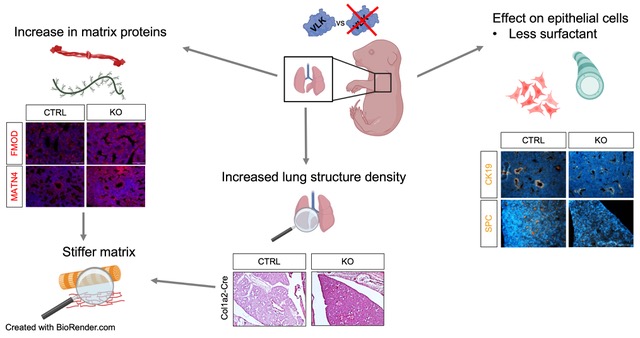Mesenchyme-derived VLK controls lung organogenesis by altering the matrisome
A "Cellular and Molecular Life Sciences" paper by the Bordoli group (Werner lab, IMHS) sheds light onto the role of vertebrate lonesome kinase (VLK) in lung organogenesis. Mesenchyme-derived VLK regulates matrix dynamics and ultimately alveolar epithelial cell differentiation by altering the matrix proteome.

VLK is the only known secreted tyrosine kinase accounting for the phosphorylation of secretory pathway-resident and extracellular substrates. In this study, mice lacking the VLK gene (Pkdcc) in mesenchymal cells were generated. Most of the homozygous mice had lung abnormalities and died shortly after birth, likely due to respiratory failure. E18.5 embryonic lungs showed a reduction of alveolar type II cells, smaller bronchi, and increased lung tissue density. Global mass spectrometry-based quantitative proteomics identified 97 proteins with significantly, at least 1.5-fold differential abundance between genotypes. 25 of these had been assigned to the extracellular region and 15 to the mouse matrisome. The matrix proteins fibromodulin and matrilin-4 were significantly more abundant in lungs from Pkdcc knockout embryos. These results support a role for mesenchyme-derived VLK in lung development by regulating matrix dynamics and subsequently modulating alveolar epithelial cell differentiation.
Link to the publication in external page "Cellular and Molecular Life Sciences".